To prepare your toddler for kindergarten, focus on developing key skills across various areas. Encourage language growth through storytelling and early literacy activities. Foster social skills with sharing, turn-taking, and emotional expression. Build independence by assigning simple chores and self-care routines. Enhance fine motor skills with crafts and play that involve cutting and building. Support gross motor skills through active play like jumping and climbing. Keep exploring these essential skills for a successful shift into kindergarten.
Key Takeaways
- Develop language skills by engaging in storytelling, reading together, and encouraging vocabulary-building conversations during daily activities.
- Foster social skills through cooperative play, sharing, and learning to recognize and express emotions effectively.
- Enhance independence by practicing daily living skills like dressing, personal hygiene, and simple chores to build confidence and responsibility.
- Strengthen motor skills with activities like playing outdoors, using fine motor toys, and engaging in creative play such as drawing or building.
- Encourage cognitive development through counting, recognizing shapes, and participating in matching games to support early math skills.

4 Preschool Learning Flipbooks, 96PCS Double Sided Printed Cards Set, Alphabet Letter A-Z, Number 1-20, Feelings and Emotions, Shapes and Colors Mini Board Books Set Early Educational Tool for Kids
Package Includes: It comes with 4 mini board books (total 96 double-sided cards), and the content covers 26…
As an affiliate, we earn on qualifying purchases.
As an affiliate, we earn on qualifying purchases.
Language Skills for Effective Communication
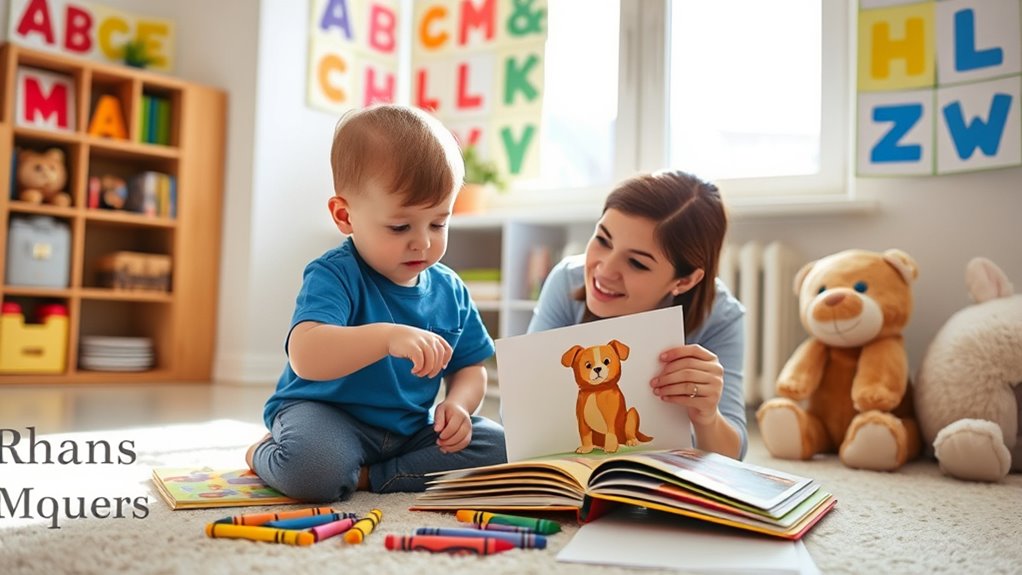
Language skills are essential for effective communication, especially as your child prepares for kindergarten. You can help by encouraging them to identify and describe pictures in books, which boosts their vocabulary and comprehension. Regular playtime with engaging toys can also promote language skills through interaction and conversation. Engaging with educational toys that stimulate cognitive growth can further enhance their language development. Encourage them to use sentences with four or more words and participate in simple conversations, enhancing their conversational skills. Practicing following three to four-step directions will improve their understanding and responsiveness. Aim for close to 100% intelligibility, so others can easily understand them. Additionally, fostering effective communication can be achieved through engaging in storytelling and recall activities to bolster their ability to remember events. By integrating these foundational communication skills into daily life, you’ll set the stage for successful interactions both in the classroom and beyond. Engaging in playtime routines can further enhance your child’s language skills by incorporating fun and interactive activities. Additionally, utilizing engaging toys like the Reading Readiness Activity Set can enhance their language development through interactive play.

Learning Resources All Ready for Kindergarten Readiness Kit – Classroom Must Haves, Toddler Activities, Homeschool Supplies, Learn to Read, Spelling , Alphabet Kindergarten Workbook
SCHOOL READINESS – Build essential kindergarten skills through play with our comprehensive kit featuring activities for alphabet recognition,…
As an affiliate, we earn on qualifying purchases.
As an affiliate, we earn on qualifying purchases.
Early Literacy Foundations
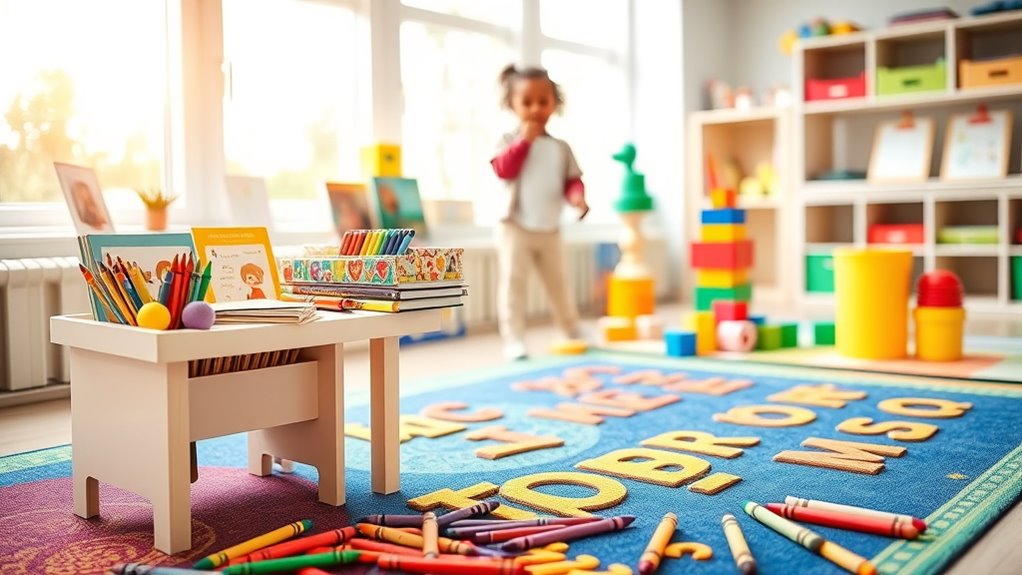
Early literacy foundations are essential for your child’s success in kindergarten and beyond. Creating a literacy-rich environment at home encourages an interest in reading. Cozy reading nooks invite your child to explore a variety of books, fostering a love for storytelling. Incorporate literacy into daily activities to support vocabulary development and engage in phonemic awareness through fun games like rhyming. Understanding the alphabetic principle—connecting letters with sounds—plays a vital role in early reading. Encourage your child to recognize and write the alphabet, and help them identify letters in their name. Additionally, fostering social factors that promote language use during playdates can further enhance your child’s communication skills. Engaging in shared reading experiences can also help develop emotional well-being, as it strengthens the bond between you and your child while nurturing their love for books. Furthermore, regular outings to puppy training classes can provide opportunities for social interaction that mirror the importance of engaging environments for literacy development. Additionally, providing resources for researching various activities can support your child’s learning journey in multiple ways.

Wooden Puzzles Shape Color Matching Board Games Preschool Educational Montessori Toys for Kids 3 4 5 6 Years Old Boys Girls Brain Teaser Puzzle Logic Game with Bell Cards
What You Get: 2 wooden game boards, 32 wooden blocks (4 colors: red, blue, green, yellow & 4…
As an affiliate, we earn on qualifying purchases.
As an affiliate, we earn on qualifying purchases.
Developing Listening Skills
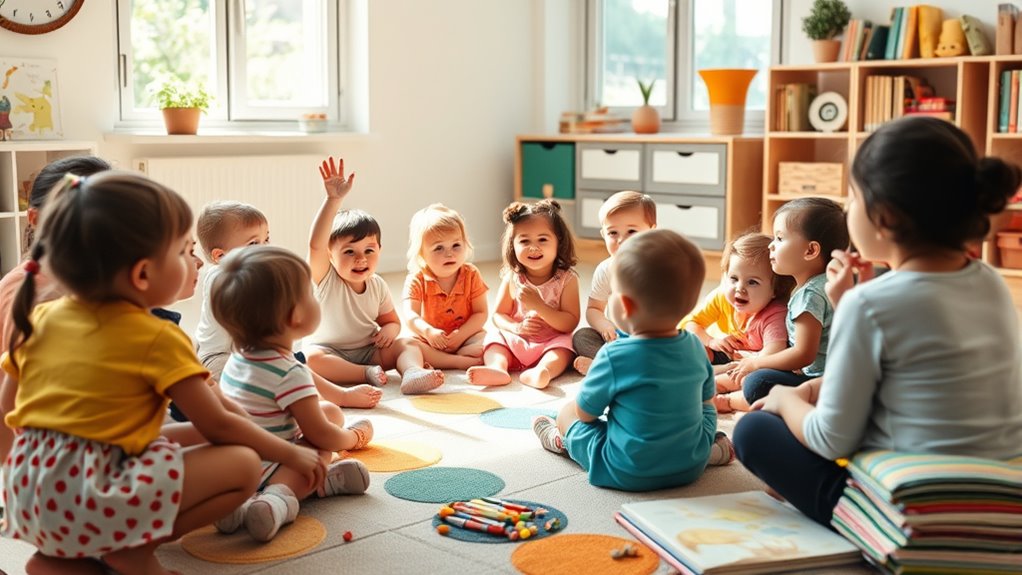
Building on the foundation of early literacy, developing listening skills is equally important for your child’s readiness for kindergarten. Active listening involves giving full attention to the speaker, maintaining eye contact, and using nods and smiles to show engagement. Engaging in activities that promote high vibrational energy can also enhance your child’s ability to focus and listen effectively. Incorporating a healthy breakfast into your child’s morning routine can further support their cognitive function and attention span. Additionally, dreaming is a natural part of healthy sleep cycles, which can positively influence your child’s daytime listening skills. Fresh fruit juices, like citrus fruits, can also provide essential nutrients that support cognitive function.
Encourage your child to ask questions, which fosters communication and understanding. Incorporate interactive activities like reading aloud and singing preschool songs to enhance auditory development. Additionally, exposing your child to calming music can improve focus and support their overall listening abilities.
Daily routines can also build listening skills; start with simple one-step directions and gradually add complexity. Use positive reinforcement to motivate compliance and structure routines for predictability.

Melissa & Doug Primary Lacing Beads – 30 Wooden Beads for Crafts & 2 Laces in Toy Storage Box, Small Beads for Kids Arts and Crafts Kits, Preschool Learning Toys for Girls & Boys Ages 3+
Brightly Colored Wooden Craft Beads: The Melissa & Doug Primary Lacing Beads set includes 30 colorful wooden beads…
As an affiliate, we earn on qualifying purchases.
As an affiliate, we earn on qualifying purchases.
Social Skills and Peer Interactions
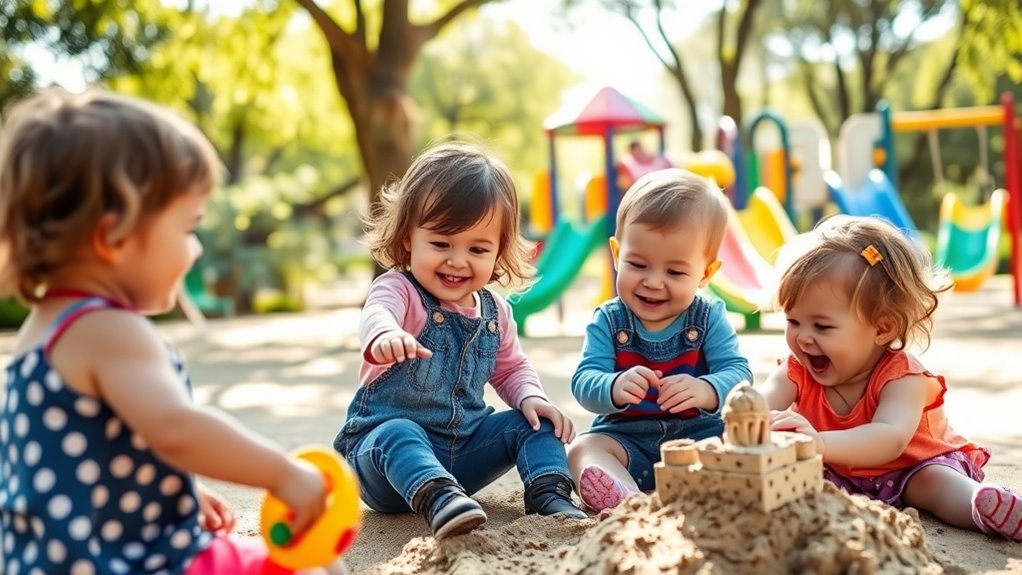
As your child prepares for kindergarten, developing social skills and peer interactions plays an important role in their overall readiness.
Encourage cooperation with adults by practicing following directions and asking for help when needed. Sharing and taking turns are crucial skills that foster friendships, so create opportunities for this at home. Engaging in mindfulness practices can also help children become more aware of their emotions during these interactions. Additionally, participating in themed events, like special events, can provide unique opportunities for children to practice these social skills in diverse settings.
Engage your child in group play to promote collaboration and respect for others’ opinions. Teach emotional expression and regulation to help them manage their feelings in social situations. Understanding emotional expression is vital for navigating friendships effectively, as it can improve emotional alignment with peers.
Role-playing can enhance empathy, while effective communication skills guarantee they can express needs clearly. Incorporating digital literacy programs can also support their ability to connect and communicate with peers in today’s technology-driven world.
Building Basic Independence
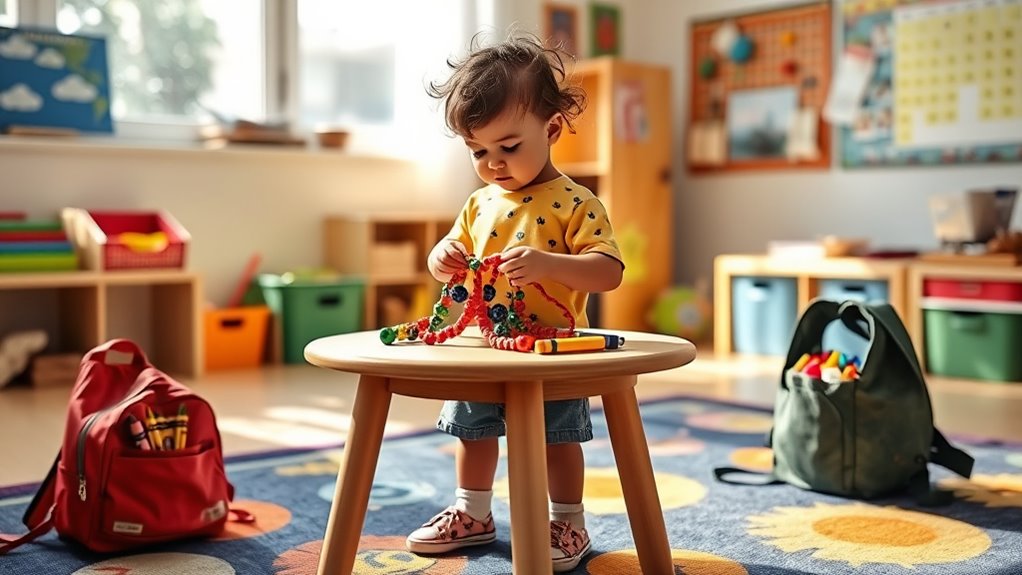
Social skills lay the groundwork for successful interactions, but fostering independence is equally important as your child gets ready for kindergarten. Start by encouraging clothing management—let them pick out their clothes and dress themselves. Engaging in these activities can help build emotional well-being, which is crucial for their overall development. Additionally, teaching them about the importance of advance directives can help them understand the value of making decisions for themselves.
Encouraging clothing management fosters independence, helping your child build confidence as they prepare for kindergarten.
In the kitchen, tasks like getting a snack or pouring water can boost self-reliance. Establish morning routines for waking up, dressing, and using the bathroom, which help develop confidence and independence.
Assign simple chores like putting toys away to teach responsibility. Personal hygiene tasks, such as brushing teeth and washing hands, are essential too. Additionally, understanding the importance of water sources can help your child learn about basic needs and responsibility in their environment.
Practicing these daily activities not only builds independence but also prepares your child for school, setting a solid foundation for their growth and development.
Nurturing Emotional Awareness
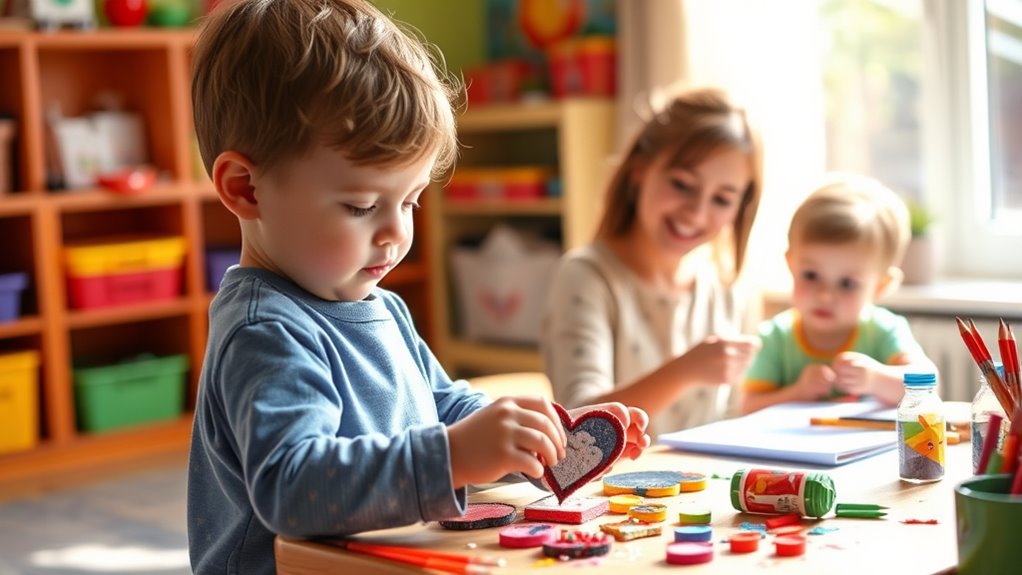
While your child prepares for kindergarten, nurturing emotional awareness is essential for their overall development. Start by helping them recognize basic emotions like happiness and sadness. Encourage them to express their feelings using words or through drawing.
Use storytelling to explore different emotions, enhancing their understanding of others’ feelings and empathy. Teach simple emotion regulation strategies, such as deep breathing, to help them manage intense feelings.
Create opportunities for social interaction, where they can practice sharing, taking turns, and developing empathy through play. A supportive environment fosters their emotional growth, making them more prepared for the structured setting of kindergarten.
Engaging in these activities builds their emotional readiness, setting the foundation for a successful school experience.
Enhancing Fine Motor Skills
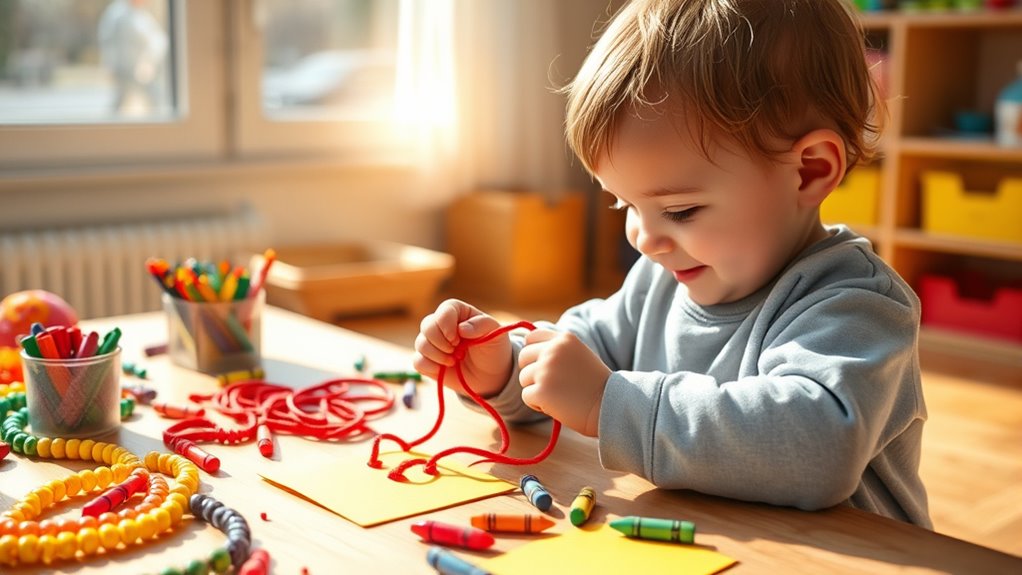
Developing fine motor skills is essential for preparing your child for kindergarten, as these skills lay the foundation for many classroom activities.
Start by introducing playdough to build hand strength and dexterity. Activities like using tongs or tweezers to move small objects will enhance their hand-eye coordination.
Introducing playdough and tools like tongs can significantly enhance your child’s hand strength and coordination.
Encourage finger painting to practice grip control and hand movements. Building with small blocks helps improve spatial awareness and fine motor control, while threading beads develops their pincer grip.
Daily tasks like setting the table, dressing independently, or using child-safe scissors can also boost these skills.
Gross Motor Skills for Physical Development
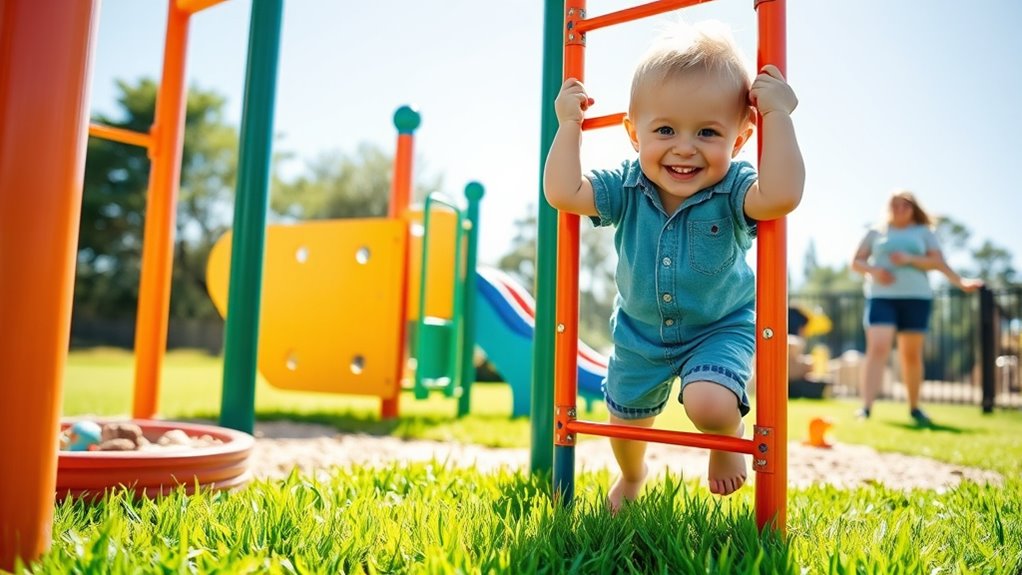
Gross motor skills are essential for your child’s physical development, as they involve large muscle movements fundamental for everyday activities. These skills, which include walking, running, jumping, and climbing, typically develop from infancy through early childhood.
For kindergarten readiness, your child should be able to skip, jump, and kick a ball, as these abilities enhance brain growth and spatial awareness.
You can support gross motor skill development at home through outdoor play, obstacle courses, ball games, and dance parties. Engage in family sports or community programs to make it fun.
Natural exploration, like climbing and balancing exercises, also helps strengthen these skills. With your encouragement, your child will be well-prepared for the physical demands of kindergarten.
Math and Number Recognition
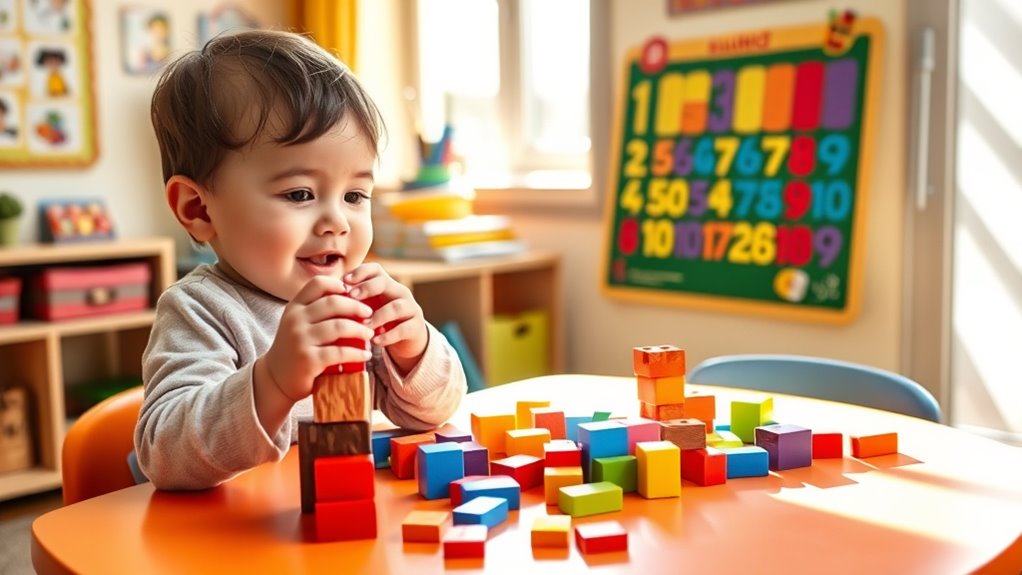
Math skills form an essential part of your child’s early education, laying the groundwork for future learning. Start by encouraging your toddler to count everyday objects, helping them grasp the idea that numerals represent quantity.
They should recognize numbers from 1 to 10, and counting by ones, fives, and tens up to 100 will enhance their number sense. Introduce shapes like circles, squares, and triangles, and engage in sorting activities to develop critical thinking.
Use matching games to improve visual discrimination, and compare sizes and quantities through fun activities. Incorporate number stories and cooking to reinforce measurement concepts, and trace shapes and numbers for better fine motor skills.
These foundational experiences will set your child up for success in kindergarten.
Essential Self-Care and Daily Living Skills
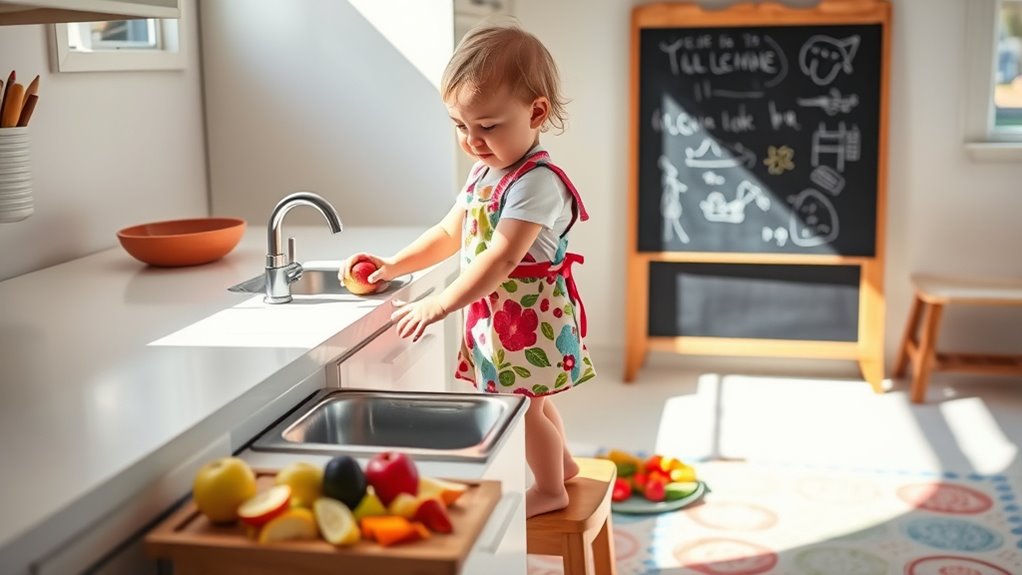
As your child approaches kindergarten, mastering essential self-care and daily living skills becomes essential for their independence and confidence. Encourage them to brush their teeth with minimal supervision and wash their hands before and after meals.
As kindergarten approaches, nurturing self-care skills boosts your child’s independence and confidence.
Teach them to use tissues for blowing their nose and to wipe their mouth and hands after eating.
Fostering clothing skills is equally important; let them practice dressing themselves and identifying weather-appropriate clothing.
Mealtime skills like feeding themselves with a fork, pouring water, and using a napkin are significant too.
Finally, make sure they can use the toilet independently, flush afterward, and handle their clothing.
Frequently Asked Questions
How Can I Help My Toddler Cope With Separation Anxiety?
To help your toddler cope with separation anxiety, start by establishing a consistent goodbye routine that reassures them you’ll return.
Engage in role-playing scenarios to familiarize them with separations. Use positive affirmations and validate their feelings to build confidence.
Gradually encourage independence by leaving them with trusted caregivers. Teach calming techniques, like deep breathing, and maintain a predictable daily routine to minimize anxiety.
Always communicate openly about their feelings and experiences.
What Activities Promote Self-Confidence in Young Children?
To promote self-confidence in young children, engage them in various activities.
Encourage climbing and outdoor play, which build physical strength and teamwork skills. Introduce role-playing and imaginative play to help them explore different scenarios and boost creativity.
Participate in cooperative games that foster social interaction and teamwork. Recognize their achievements and involve them in volunteer activities, allowing them to experience a sense of purpose and accomplishment, enhancing their overall self-esteem.
How Can I Encourage My Child to Resolve Conflicts?
Think of conflict resolution as a bridge connecting two islands of misunderstanding. You can encourage your child to cross that bridge by teaching them deep breathing techniques to calm down first.
Use role-playing to practice expressing feelings and needs, and emphasize the power of active listening. Help them brainstorm solutions together, guiding them to compromise.
Celebrate their efforts to resolve conflicts independently, nurturing their confidence and emotional intelligence along the way.
When Should My Child Start Recognizing Emotions in Others?
Your child typically starts recognizing emotions in others around age two. At this stage, they can link basic facial expressions with emotions like happiness and sadness.
What Role Does Playtime Have in Developing Essential Skills?
Playtime plays a vital role in developing essential skills. Through play, you help your child refine cognitive abilities like problem-solving and memory.
They learn social norms, empathy, and cooperation while interacting with peers. Emotional intelligence flourishes as they express and manage feelings.
Physical activities enhance motor skills and coordination, promoting overall health. By engaging in various types of play, your child gains valuable experiences that support their growth in multiple areas.
Conclusion
As your little one gears up for kindergarten, remember that these skills are the stepping stones to their future success. Just like a garden flourishes with the right care, nurturing their language, social, and motor skills will help them blossom into confident learners. Embrace this journey together, and watch them thrive with independence and curiosity. With your support, they’ll be ready to tackle new challenges and make friends, turning the page to an exciting chapter in their lives!









